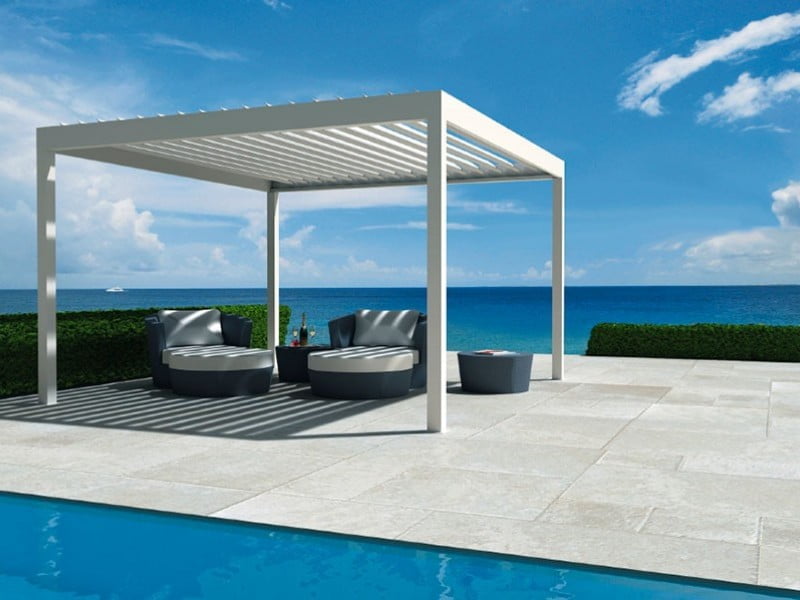- You can now follow us on Facebook for regular updates and news or directly message us.
- To get a unobligated quotation or free advise from our specialists, please contact us without hesitation. You will also directly get a $200 voucher.
- We are specialised in providing bespoke pergola and awnings service. Please feel free to view our product portfolios and we have prepared our product brochures ready to download.
Should a pergola be attached to your house or freestanding? We found that it is a difficult question many homeowners have asked us or have actually asked themselves many times before reaching to us. There are benefits and drawbacks to both pergola types, so it’s important for you make an informed decision about whether this is something you want in your backyard. But do not worry, our Fresh Outdoor designers and pergola installers will help you make the best and right decision.
Before we jump into the ‘debate’ about which pergola style is better, please let me remind you of what pergolas are and how they can benefit your properties.

Pergola Buyers Guide
Contents
What is a pergola?
A pergola is an outdoor structure consisting of columns that support a roofing grid of beams and rafters. They can be left bare or equipped with blinds, curtains, and flooring for a touch of elegance. If you want a little extra, you can even incorporate spotlights into the floor or set out some candles as night. For a natural look, the wild vine can grow around the structure or train wisteria to climb up it. For more generic introduction, please visit https://en.wikipedia.org/wiki/Pergola
What key benefits can a pergola bring to you?
Greater Sydney consumers find pergolas a good investment since they add shade, contrast, colour, and design to the outdoors easily and affordably. Everyone is highly likely to love a pergola built in their garden, with a series of primary reasons including:
- Prevention from the harm of sunlight
- Rain Protection
- Wind Protection
- Improved Airflow
- Temperature Control
- Convenience
- Privacy
For more detailed information about why you should have a contemporary and customised pergola, please review our blog: Why Contemporary Pergola With Louvred Roof System Is So Popular In Sydney?
After understanding the add-on values of a pergola to your living experience. Let’s look at the difference between attached and freestanding pergolas.
Key characters of an attached pergola
An attached pergola is a lattice structure that is held in place by beams on one side and the other side is affixed to the wall of your home or building structure. With attached pergolas, there will typically be a beam that is screwed directly into the wall of a home. If the home is concrete or brick, you can use masonry anchors to attach it.
When a pergola is attached to your house it can become an extension of your home. One of the perks of an attached pergola is that you can just walk outside and enjoy your covered area as it is designed to attach to your house walls or structure. It helps create an outdoor living area easily accessible from your home. This is great for entertaining and bringing the outdoors in.
Another key benefit is an attached pergola can be smaller-space friendly. If you don’t have a massive backyard for a winding pathway out to your pergola, it can be attached directly to the home, requiring much less yard space in this set-up.
Furthermore, most homeowners will agree that a pergola attached to a house is visually stunning. It helps to create a seamless transition from indoors to outdoors and will always be a point of conversation when entertaining. Attaching a pergola to the house will also take away most of the underlying lateral stability issues associated with freestanding pergolas. Since they don’t require as many support posts, attached pergolas may also be less expensive than a freestanding pergola.

Attached Pergola
Key characters of a freestanding pergola
Freestanding pergolas need at least four posts and like the name says, standing without being attached to any other structure or wall. A freestanding pergola is typically located independent of any anchored surface like a deck or patio and therefore require the posts to be sunk into post-hole footings or to have the posts surface mounted to concrete footings. Be sure your freestanding pergola is properly anchored for worry-free enjoyment.
While a freestanding pergola can be placed close to the house, such as on a patio, most frequently the freestanding pergola is meant to be a focal point in the landscape. With a freestanding pergola, you are not limited on size, the direction it faces, or how weighty it is, which has become the first key feature a freestanding pergola has. It has more of a “destination” feel—you must go there to enjoy the benefits of the breezes and filtered sun.
The second benefit to having a freestanding pergola is that there is a lot fewer design restriction. Since you don’t have to worry about attaching it to a structure you have a lot more flexibility in terms of designs. As you have a lot of creative freedom with a freestanding pergola, you can use it for any number of purposes.
Apart from that, A freestanding pergola with canopy shade, for example, is great for an outdoor lounge area or dining space. The canopy provides shade, and the pergola is a great architectural element to anchor your entertainment space.
Another thing to note is that with a freestanding pergola there may be some more needed to address regarding neighbours and permits so keep that in mind as you are more interested in the freestanding style. Because this type of pergola needs more materials, it tends to be more expensive. But you surely cannot ignore the extra amount of value it adds to your home and would be viewed as a plus for home buyers.

Freestanding Pergola | Fresh Outdoor Pergola
What do you need to consider when selecting an attached or freestanding pergola?
After understanding the top perks of attached and freestanding pergolas respectively, our experienced pergola installers and designers will also walk you through some significant factors you would need to bear in mind while selecting the right pergola style for your home.
Space
Deciding between a freestanding or an attached pergola often comes down to how much space you need. This will be partly determined by how much exterior wall space the property can offer. If there isn’t much, you’ll only be able to attach a small pergola to the side. In contrast, a freestanding pergola places no restrictions on size or height. If you’re just looking for a space to kick back in the evening, the space afforded by an attached pergola should be sufficient. If you’re looking for a place for large get-togethers, freestanding is probably the way to go.
Cost
Cost is always going to be a concern when you’re completing a large outdoor project, and pergolas do tend to be quite pricey. However, you can cut down on your costs by opting for an attached model rather than a freestanding one. Since one side is supported by your property, you won’t need as many beams or supports. That means fewer materials and less labour.
Future Projects
If this is likely to be the only change you make to the exterior of your property, it doesn’t really matter whether you choose a freestanding or an attached pergola. However, it’s worth keeping in mind that fitting an attached pergola now will drastically inhibit your ability to make other changes in the future. For example, you won’t be able to fit decking or a conservatory in place of the pergola. If you think you might fancy making these kinds of upgrades in a few years’ time, it’s going to be better to opt for a freestanding pergola instead.
Weather
Finally, take the time to think about what kind of weather you tend to experience. If you’re in a warmer and dryer part of the area, a freestanding pergola can be nice; these pergolas are open on all sides, making them less likely to feel overheated. On the other hand, people who live in cooler and wetter areas should opt for an attached pergola. They can be accessed without crossing an unsheltered part of the garden and will benefit from some of your property’s radiant warmth.
Experienced pergola installers
More importantly, professional designs and building capabilities from trained and qualified pergola installers will certainly help you save plenty of time and energy, and also save you from frustration. They can give you a comprehensive assessment of your situation, that will lead to a solid plan of action. A good pergola installer can also keep you on budget as they have resources for everything related to the ideal pergola for you. Their trained eyes can automatically tell you what kind of pergola best suits you. Having that immediate consult is a major advantage for every pergola buyer.
